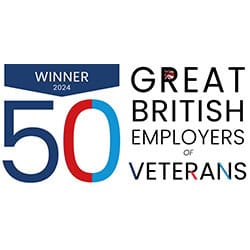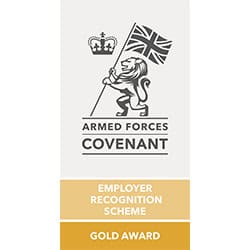FAQs
Careers frequently asked questions
We have appointed ManpowerGroup as our RPO provider for permanent and fixed term recruitment across all our UK sectors.
To discuss becoming part of the ManpowerGroup supply chain, please email [email protected]
If you would like to be considered as part of the supply chain for contingent/temporary/contractor recruitment, please email [email protected].
Start by taking a look at our Vacancies to find out how you can grow your career with Babcock.
We recruit for a wide variety of roles in locations around the world, so the process can vary slightly once we’ve got your application.
Generally, to join Babcock you’ll go through a process similar to this:
- Application: Search our full list of vacancies and follow the on-screen process to apply online. You can also upload a CV and covering letter, showing us why you think you’re right for the role. We’ll keep in touch with you by email, so make sure you give us the right address and complete all sections marked with an * .The application form may take you some time to complete – don’t worry, you can save what you’ve done and come back to it later. We don’t see your application until you submit it.
- Shortlisting: We’ll send you an email to let you know we’ve received your application, before reviewing it. We’ll let you know how your application is going, mainly by email.
- Interview: If we think your application meets the needs of the role, we might invite you to a face-to-face, online video, phone interview, or to complete a questionnaire or other assessments such as psychometric tests.
- Pre-employment screening: If you’re offered a role, it’s usually subject to us getting satisfactory references and any other pre-employment checks that may be needed.
- Offer of employment: Once all checks are successfully completed, we’ll be in touch with a confirmed offer of employment and start date. Please note that if you’ll be working on Ministry of Defence sites, you’ll have to meet MoD security requirements too.
We’re aware that, unfortunately, scammers have been offering false employment opportunities that look as if they have been sent by Babcock.
We’re treating this extremely seriously and want to make sure you only get genuine communications from us. We never send unsolicited job emails and won’t ask you for your bank details.
How the scam works
Scammers aim to take money from you by offering you a job that doesn’t exist in return for money to pay for work visas, passport clearance or payment to third parties to help you get the role.
The emails can look genuine and may even name a Babcock employee.
If you think you’ve had a scam Babcock email
Never give out your bank details unless you’re sure the email is genuine. All our emails come from a babcockinternational.com domain.
If you think you’ve had a scam email:
Let us know about the scam by emailing [email protected]. Please do not press reply or forward the email to us, but type in our address manually and send it to us as an attachment.
Check the sender’s address by pressing reply. If it’s not from a babcockinternational.com domain, it’s a scam.
Never supply personal or financial information to a third party you do not know, or who you suspect of being fraudulent. Babcock will never ask for money in connection with a job opportunity.
End all communication if you become suspicious and, if you feel it’s appropriate, report the incident to the police.
Don’t call any telephone numbers given in the email. Instead, look up the genuine telephone number on our website and use that.
Your Privacy and Babcock International Group PLC
This E-Recruitment Privacy Statement sets out how we, Babcock International Group PLC whose registered office is at 33 Wigmore Street, London, W1U 1QX (Company Number 2342138, Country of Origin: England and Wales) (“Babcock”, “We”, “Us” or “Our”), and all our subsidiary group companies intend to protect your privacy when using our e-Recruitment site, and describes your rights and the manner in which any of your personally identifiable information will be collected and used.
We strongly believe in the importance of keeping the personal information of our candidates private. We will never use your information for any use beyond that stated or the permissions you give us or to conform with our legal requirements.
What sort of data is collected?
We collect personal data about you to help in the recruitment process. This data consists of personal information such as your name, address, e-mail address, and work and education history, plus your nationality, and can include health and any criminal records.
Personal information provided by you is retained as long as the purpose for which the data was collected continues, usually up to 24 months. It is then destroyed unless its retention is required to satisfy audit, legal, regulatory or accounting requirements or to protect our interests. We will not sell, trade, rent or pass on your personal information to any organisation other than those involved in the recruitment, selection and employment process, or use this information ourselves for any purpose other than those stated here without your consent.
By continuing with your submission and registering your details with us, you consent to:
• Us collecting and processing your data, including any personal data, for the purposes of your prospective and, if successful, continuing employment with us, including, where appropriate, us conducting background and security checks and any investigation to protect our legitimate interests or those of our employees or customers, as well as for the purposes of equality monitoring
• Us passing any such data to other members of our group of companies for such purposes and to others with a legitimate reason to receive it whether within or without the European Economic Area; and
• Us passing any such data, including sensitive personal data, to professional and/or medical advisors, any prospective purchaser of any part of our group or in compliance with any legal or regulatory requirements or proceedings, including, without limitation, for security purposes, whether those of Babcock or its customers, and for trade control requirements, including to the US Government in connection with Babcock’s compliance with the International Traffic in Arms Regulations.
• Us using your data, such as an email address, to customise content and advertising, to provide social media features and in order to analyse our marketing effectiveness. We may also share information provided to us, such as your email address with our trusted social media, advertising and analytics partners for this purpose.
Your CV
When you register your CV with us it will be made available to our recruitment teams in connection with the recruitment process unless you request otherwise. Should you wish to request a change to our normal CV disclosure processes, please email [email protected]
Job Applications
If you have applied for a job through us the information you provide will be used to determine your suitability for the position and, if applicable, in determining terms of employment or engagement. It may also be included in management information used to monitor recruitment initiatives and equal opportunities policies.
If your application is progressed further, we may undertake pre-employment checks in order to verify or obtain extra information, which may include background and security checks such as credit reference and criminal record checks, academic qualification checks and employer references. Details may also be disclosed if required by law or for the purposes of Babcock’s business requirements (e.g. to auditors or third party service suppliers).
If your application is unsuccessful, we may try to find you employment with other possible matching vacancies and may use your submitted details in connection with the recruitment process (which for these purposes includes the process of gaining employment and any ongoing administrative process involved, unless you tell us otherwise).
Automated Decision Making Processes
If you apply to Babcock as part of our graduate recruitment programme, your application will go through automated decision-making processes as part of our screening process. We undertake candidate screening through initial selection questions and online testing and Situational Judgement Test. These have a pass or fail scoring therefore a decision as to whether you will proceed or not will be based as a result of your score on the screening and online testing and Situational Judgement Test.
The purpose of this activity is to ensure that we recruit and select individuals to work at Babcock with the appropriate ability and skills for the Graduate programme. This processing is necessary to take steps in entering a contract of employment with Babcock International Group.
Keeping you informed
In order to keep our records up to date, you may want to tell us if any of your circumstances change or you may from time to time receive relevant information and reminders from us connected to the service you have requested. Should you not wish to receive such information and reminders from us please contact [email protected].
Notification of changes
Any changes we make to our E-Recruitment Privacy Statement will be set out here on this page of the website. If at any time you have questions or concerns about the policy please convey them by emailing [email protected].
Acceptance
You agree that any information, including your CV, which is collected by Babcock on this website is accurate and complete and may be used and disclosed for such purposes and to such third parties in accordance with our E-Recruitment Privacy Statement. You understand that any misrepresentation of any information provided by you may result in the termination of any application or employment.
By submitting your personal information, including your CV, you agree that you have read, understood and accept our E-Recruitment Privacy Statement.
You also consent to the use, transfer and disclosure of the information referred to throughout this E-Recruitment Privacy Statement.
Our website
a) Privacy
babcockinternational.com is owned and operated by Babcock International Group PLC.
We strongly believes in the importance of keeping the personal information of visitors to the website private. We will not use your information for any use beyond that stated or the permissions you give us.
b) Cookies
Our website does use cookies. However the cookies do not store personal information, or any information about the computers being used to access the website. The cookies contain only a generated code value that is used by our Web Server to ensure the security of your data and login.
c) IP Addresses and Server Logs
Our website does record IP addresses and produces server logs – as all Web Servers do. This information is used solely for monitoring the volume of traffic the site receives and measuring the number of visitors. We do not use the information for tracking the activities of specific visitors to the site.
d) Unsubscribing
To unsubscribe from our job alerts, please click on the unsubscribe link in any Babcock job alert email.
To delete your account, please email [email protected]
Enquiries
If you have any queries about our E-Recruitment Privacy Statement, please email [email protected].
E-Recruitment Agency Disclaimer
Only direct applications from individuals will be accepted through this site. Any applications submitted by employment agencies on behalf of an individual through this site will be automatically rejected. Any agreed agencies with an account wishing to submit an application may only do so through their designated access route.
rom supporting national defence to saving lives and protecting communities, Babcock provides critical, complex engineering services in the UK and internationally.
Babcock delivers vital services and we manage complex assets for customers across three key markets; defence, emergency services and civil nuclear. You could be part of this, leveraging the technology, expertise, infrastructure and assets to ensure delivery to our customers.
Career Opportunities at Babcock
Working for Babcock will give you the opportunity to develop your career, with fantastic prospects for promotion, along with the ability to learn transferrable skills and earn nationally recognised qualifications.
As a leading engineering organisation, we regularly recruit experienced hires within engineering and technology roles but also recruit service leavers, reservists, apprentices, graduates and undergraduates.
Find out more about a typical Day In The Life of a Babcock employee by following the link. Take a look below at the roles were are currently recruiting for here.
We offer generous rewards and benefits packages, including pension schemes and share ownership.
We believe in creating a working environment based on dignity and respect, bringing together individuals from many different backgrounds to give us fresh perspectives and new ideas.
Start by taking a look at our vacancies and take your career wherever you want to go.
Babcock operates an ‘Agile Working’ approach across most of our business sectors, as we balance the needs of our customers, employees and business. We recognise that ‘Agile Working’ offers more choice and autonomy about how, when and where we do our best work. We are more than happy to discuss flexible working, so please ask about agile patterns of work at interview.
Many of our jobs can involve some level of hybrid working arrangements, the level of flexibility can vary depending on the requirements of the role. Your role could involve working from any Babcock Hub along with some hybrid working, or it could involve regular travel to a site alongside hybrid working, or it could be that your role is delivered from a number of named sites. To find jobs which offer some level of hybrid working arrangement go to Hybrid Jobs.
- An onsite job is where you would need to be onsite full time to perform the role.
- A hybrid job typically has some flexibility, depending on the role. It could involve working from any Babcock Hub and some hybrid working, or it could involve regular travel to a site alongside hybrid working, or it could be delivered from a few named sites.
- A field based job is where you typically travel regularly between different customer sites.
If your search is very specific with limited numbers of correct results, you’ll see the 10 most recently posted jobs. We recommend that you widen your search criteria. You can search by keyword, location and ‘Onsite or Hybrid’ or you can use the map to search for jobs in specific locations.
Once you have found the job you are interested in you’ll find a link to apply to the job. You will need to read and accept the E-Recruitment Privacy Statement before answering the application questions. Start by taking a look at our vacancies.
To apply for a role at Babcock, you’ll need to create a candidate account.
Once you have followed the steps to set up your account, you will be asked to upload a CV and Cover Letter and then click “save”. You are now ready to search for roles of interest on the “Job Search” tab at the top of the “My Candidate Profile” page.
Please follow the link to log in to your account.
Please click here to register for job alerts.
You will need to log in to your account using your username and password. You can then change your registered details.
Yes. If you’re signed in to LinkedIn when you apply, some basic details from your LinkedIn profile will automatically pre-populate. You will still need to complete additional information and provide your CV.
Yes. If you upload a CV or covering letter to your profile this will automatically be included with your application. You can delete these documents in your profile and also in the application page for specific jobs and replace them with other versions.
In the UK we are unable to employ anyone who does not have the legal right to live and work in the UK. Babcock may consider supporting successful candidates who do not have suitable immigration status which allows them to live and work in the UK to comply with UK immigration requirements. This will be subject to the immigration laws and requirements in force at the relevant time. As part of our recruitment process candidates are required to provide the relevant information and documentation to demonstrate their right to live and work in the UK.
If you have an enquiry about a specific vacancy please use the contact details provided in the job advert. For general assistance please email [email protected] or follow the link for careers contacts outside the UK.
A list of careers events where you can speak to Babcock is available on our events page.
Babcock International Group is proud to support the UK’s Armed Forces and Reservists. We support members of the Armed Forces Community such as Service Leavers, Veterans, Reservists, Uniformed Cadet Instructors and their spouses. If you are a Service Leaver, Veteran or Reservist you will be guaranteed an interview if you meet the minimum requirement for the role. Find out more about our Armed Forces Commitment.
If you are a military service leaver you’ll find us at CTP employment events throughout the UK. A list of these is available on our events page.






